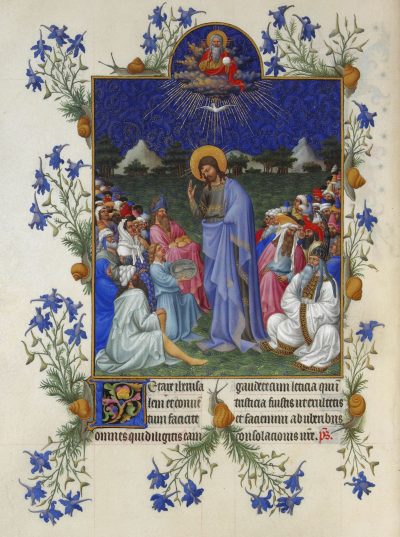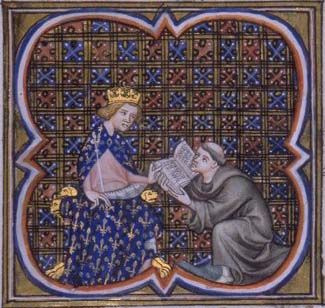Sermon given at All Saints, St Andrews July 29, 2018 (Feast of St Olaf, and Sea Sunday)
[Readings: 2 Kg 4.42-44; Ps 145.10-19; Ephesians 3.14-21; John 6: 1-12]
“All thy works shall give thanks to thee, O LORD, and all thy saints shall bless thee! They shall speak of the glory of thy kingdom, and tell of thy power, to make known to the sons of men thy mighty deeds, and the glorious splendor of thy kingdom.”
There can be no doubt the Scriptures are often full of praise for the glories of nature, and how our observance and appreciation of nature calls to mind God’s divine power as Creator, Sustainer and the Lord of Creation. At extraordinary times this power over creation is often worked through human agents, such as the Prophet Elijah in our first reading, and of course miracles, or extraordinary signs of God’s power, are events most dramatically also associated with the life and ministry of Jesus himself, from the Virgin Birth through the Wedding at Cana to the multiplication of the Loaves and Fishes, walking on water, to the raising of Lazarus and His own glorious Resurrection. The fact that the prophets could work miraculous signs, and the signs worked by Christ, is integral to the Biblical Narrative, as we saw in our first reading. Interestingly, control over nature has often been expected in the lives of the saints in the Christian folk tradition. Today as it happens, is the Feast of St Olaf, the patron of Norway, an eleventh century royal seafarer who ranged far and wide in the northern world fighting battles as far afield as London and Russia.
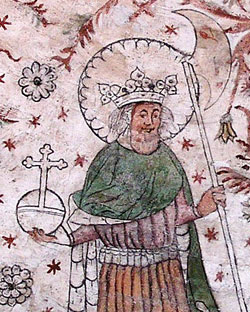
Eventually as king of Norway who set out, often by rather stern methods, to unite the country and Christianise its hinterland, Olaf was killed in battle by his pagan enemies on this day in 1030. He was soon venerated as a saint, ultimately as Norway’s Eternal and Apostolic King, Olaf’s memory is celebrated in Catholic, Orthodox, and various Anglican and Lutheran calendars, a recognition that his shrine in Trondheim became a great centre of pilgrimage in Scandinavia, not unlike St Andrews here, until the Reformation. And not unlike St Andrews, pilgrimage is now being revived in Norway much like in Fife, pointing to a strong spiritual need that pilgrimage has an enduring power to satisfy.

Trondheim cathedral
According to one story popular in the middle ages, Olaf posthumously had defeated a sea monster who was threatening some sailors, and one could still point to the spot where he had dashed it against a cliff! Here we have a bit of Thor defeating the Midgard serpent, but also, significantly, Christ walking on water and calming the storm. It gave comfort to sailors in their dangerous work to know that God and his saints could work such miracles of power. In this beautiful church, on a day when in our collection we call to mind fishermen and sailors, and gaze at the lovely votive ship we have hanging in the nave of the church, and as someone who has a long line of Norwegian sailors and fishermen in my own ancestry, I must admit to being moved by the faith and piety that these tales nourished. And even if God did not always choose to vanquish enemies on the field of battle, as Olaf experienced in his last battle, His Power meant much more than that, and trust in Him led to eternal life.
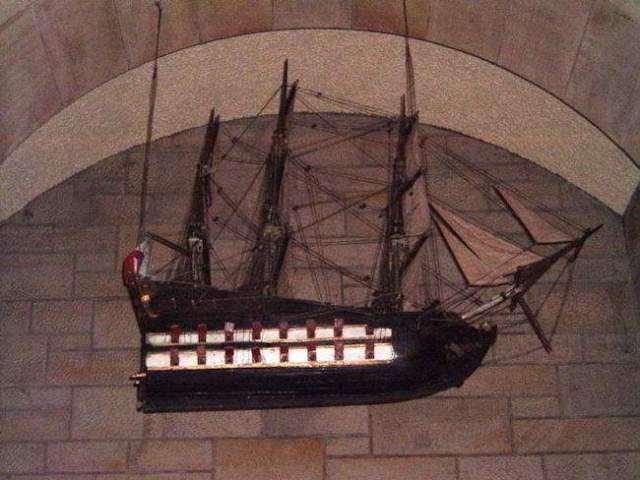
Votive Ship in the nave of All Saints
Jesus certainly could do signs, perform miracles of power and in fact the Gospel of John is famously structured around these signs; and there is no doubt Jesus is portrayed by John as fulfilling the promise of OT prophets, and the lectionary today makes that connection clear. But this connection between the Old Testament and the miracles of Jesus goes back to early Church interpretation, as St John Chrysostom pointed it out in the 4th century when preaching on these texts. Chrysostom felt that in this passage we just read, the Apostle Andrew (and we can take heart here as he is our patron), is very conscious of his Bible, as, following the remark of Philip, he probes Jesus further on the need to feed the crowd, saying: “There is a lad here who has five barley loaves and two fish; but what are they among so many?” Chrysostom goes on to say:
“I believe that Andrew did not speak without a reason, but because he knew of the miracle Elijah had wrought with the barley loaves. For the prophet had fed 100 men with twenty loaves. Andrew’s mind therefore rose somewhat higher; but he did not rise to the heights, as appears from what follows: But what are they among so many? For Andrew reckoned that He who was wont to perform miracles would make fewer from the few, and more from the greater number. But this was not so. For He could as easily feed the multitudes from a few loaves as from many. For he needed no subject matter. But lest created things seem outside the power of His wisdom, He uses created things to work His wonders.”
John’s gospel presents Andrew as a significant figure among the disciples of Jesus. Andrew is not only the ‘first called’ among the apostles, and the one who introduces his brother Simon Peter to Jesus, but also most importantly he had been a disciple of John the Baptist. Presumably Andrew witnessed John the Baptist being questioned, and responding in the negative, about whether he was the Messiah or Elijah, and must have pondered all this as he began to follow Jesus. In this context of the hungry multitude, Andrew may well have had the Elijah story of feeding the 100 in mind as he continued to discern who Jesus was, and this would go along the lines of what Chrysostom speculates. Andrew must have been aware that John the Baptist did not perform miracles, as Elijah did and the Messiah was expected to do, and in a sense his whole life was a sign (medieval exegetes loved to discuss this!). The narrative of John seems to hint that Andrew, the former disciple of the Baptist, feels Jesus can and perhaps should do something here, and his words are perhaps a gentle hint of things he thinks Jesus is capable of, and like Mary at Cana, is prompted by divine inspiration to move beyond the words of Philip, to prod Jesus to set the stage for a further sign. And so Jesus complies and exceeds even the miracle of Elijah.
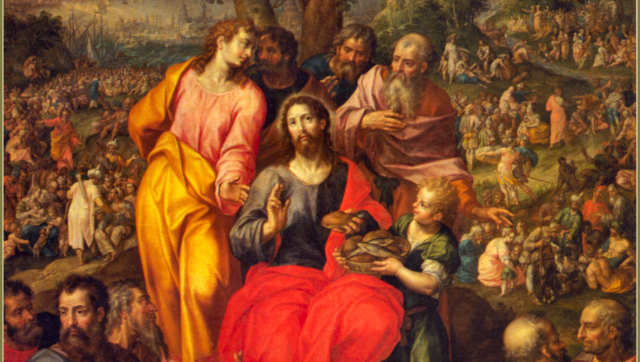
But there is more. This miracle should indeed induce us to give thanks and great glory to God for his works, both his creation and his lordship over creation; As the fourth century writer St Hilary put it in response to this miracle:
“Five loaves are accordingly placed before the multitude, and broken in pieces. The new increase flowing imperceptibly from the hands breaking the fragments; the bread from which they are broken not growing less, while the portions broken off continue to fill the hand that is breaking them. Neither sense nor sight can follow the progress of the wondrous operation; That is now which was not; that is seen which is not comprehended; what alone remains is to believe that God can do all things.”
Yet as we accept these signs for what they are, and the happiness and joy and wonder their contemplation rightly brings us, we can grow uneasy as we realize that this is not enough, that Jesus is calling us to do something more than follow Him because of His signs. His plan is clearly not just to keep multiplying bread and calming storms and walking on water, no more than it is to keep healing every single person suffering from an illness. It is clear, often to our dismay, that we cannot expect this sort of sign at all times, in every circumstance.
Jesus in fact in the Gospel at several places expresses frustration that the crowds only want signs, whereas he wants them to focus on something else, namely the message and teaching that accompanies these signs. Jesus, as Andrew found out, cannot only do many times over what Elijah did, but that, just as there was someone greater than Solomon here, there was also someone greater than Elijah here. Following this miracle Andrew and the others were soon to hear Jesus teach something about himself which was much harder to understand but exponentially greater. For the rest of Chapter 6 in John’s gospel Jesus will move beyond this sign and miracle of the loaves to claim and assert in breath-taking and quite shocking terms to his audience that He Himself is the Bread of Life, which we are first of all called upon to hear and ponder and allow to work into the very marrow of our souls; likewise there is now seen from the vantage point of this side of the events known as the Last Supper, Passion and Resurrection, a clear Eucharistic meaning to his words and deeds, which bring out for us the fullness of the meaning of the loaves and fishes; and in just a few moments we will approach the altar to receive his very body and blood. Word and Sacrament working together, Jesus the bread of Life will renew us and transform the inner man as described by St Paul.
Over 12 centuries ago, one of the great lights of the early Church in the North, the remarkable teacher and exegete Alcuin of York, made this very connection as he wrote about how Christ performed this sign we ponder today as he approached Jerusalem for the great feast of Passover:
“That Christ fed them at the approach of the Pasch signifies that whosover desires to be nourished by the Bread of the Divine Word, and by the Body and Blood of the Lord, should make a spiritual pasch; that is, pass over from the vices to the virtues.”

Echoing the Psalm we prayed today, Alcuin continues,
“The eyes of the Lord are truly spiritual gifts, which he mercifully bestows upon His elect, whenever He turns His eye upon them: that is, when he bestows on us the rewards of filial devotion.”
Every time we approach the altar, as loving and humble children of God, filled with the grace of what Alcuin calls ‘filial devotion,’ we, in a very real sense are on a pilgrimage, no less than those who went and still go to the shrines of St Olaf or St Andrew. We are on a journey to encounter the living God, and we cannot do it by ourselves. Participation in God’s glory depends on his grace and the gift of faith, but we in all humility must recall we are in the presence of something greater than Solomon and Elijah here, although they and all the company of saints, Olaf and Andrew included, and hosts of angels, are with us right now, offering praise and thanksgiving, that cloud of witnesses whose fellowship should be our joy and delight. As Alcuin and the whole tradition of the Church and the very words of Scripture urge us over and over again, we can confidently hope and ask to move beyond the veils that so often cloud our understanding, vision and way, to move beyond the signs to the reality behind them, that is so much more than we can ever imagine, the God Who is Love, so capable of changing us and transforming us into the persons God wants us to be; to bring about the renewal of our inner selves, as St Paul says,
“…that Christ may dwell in your hearts through faith; that you, being rooted and grounded in love, may have power to comprehend with all the saints what is the breadth and length and height and depth, and to know the love of Christ which surpasses knowledge, that you may be filled with all the fulness of God.”
This is our destiny as Christians, this is what we want, this is why we are here today; as we have pondered God’s Word in Scripture, and find Him also in those all around us in this congregation, and encounter Him in the Eucharist, let us ask the Lord for this right now, in the words of Alcuin:
Eternal light, shine into our hearts,
Eternal Goodness, deliver us from evil,
Eternal Power, be our support,
Eternal Wisdom, scatter the darkness of our ignorance,
Eternal Pity, have mercy upon us;
that with all our heart and mind and soul and strength
we may seek your face
and be brought by your infinite mercy to your holy presence;
through Jesus Christ our Lord. Amen.
